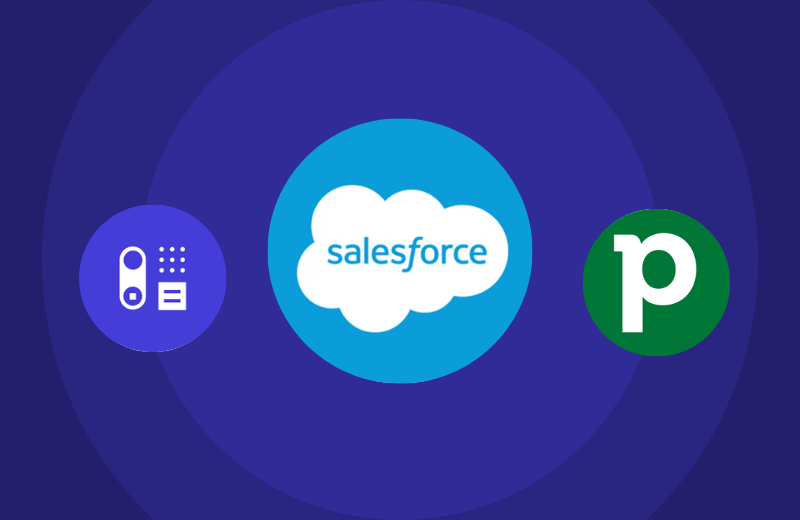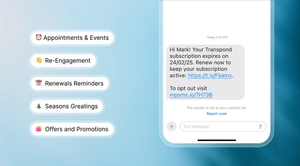Many businesses find themselves confused by Salesforce's complexity, overwhelmed by features they don’t need, and drained by the high costs.
The good news? Not every CRM has to feel like a never-ending project. There are tools built to help you stay organized, grow your customer relationships, and hit your goals without the steep learning curve or budget strain.
In this guide, we’ve rounded up seven Salesforce alternatives that focus on what matters most: usability, flexibility, and results. If you’re ready for a CRM that works with your team these options might be exactly what you’re looking for in 2025.
What is Salesforce?
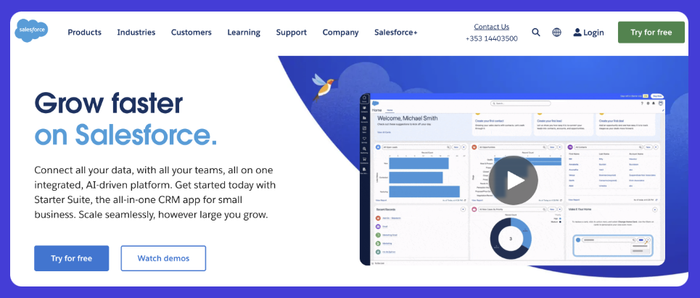
Since its launch, Salesforce has evolved from a simple CRM into a comprehensive platform that connects sales, marketing, and customer service under one roof.
As a cloud-based system, Salesforce lets teams collaborate from anywhere – whether tracking leads, running campaigns, or resolving customer inquiries. With tools like built-in AI, automation, and extensive integrations, it gives businesses the resources to keep their customers at the center of everything they do.
Salesforce features
Salesforce provides an extensive set of tools to simplify business operations and drive growth. Here’s what makes it stand out:
- Customer profile organization with detailed communication history and essential data.
- Sales opportunity tracking through every stage of the pipeline.
- Lead capture and nurturing using tools like web-to-lead forms for seamless management.
- Team collaboration with real-time updates and insights shared via tools like Chatter.
- Task automation through drag-and-drop tools to save time for more critical work.
- Sales forecasting with AI and historical data to improve decision-making.
- Customizable reporting and analytics for clear insights into sales and customer activity.
- Mobile access for managing leads and opportunities from anywhere.
- Territory management to assign the right reps to the right customers effectively.
- Third-party app integration to connect all business tools in one platform.
- Targeted marketing campaigns powered by advanced multi-channel tools.
- Data protection with robust security features like encryption and authentication.
- Customer interaction management through dedicated customer service tools.
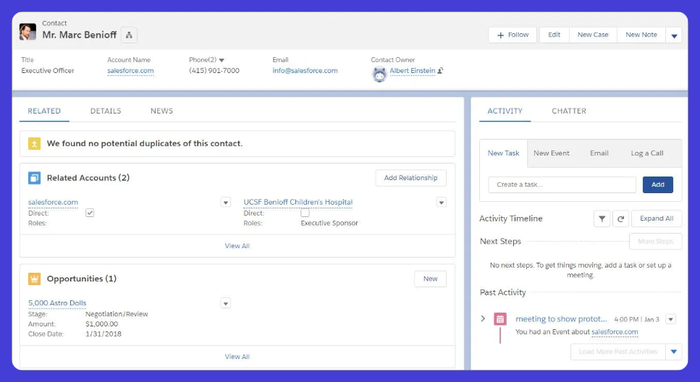
Salesforce pricing
- For Sales Cloud, the Starter plan begins at $25 per user per month, giving smaller teams the essentials for managing sales and service.
- The Professional plan, priced at $80 per user per month, brings more tools like forecasting and customizable reports.
- Bigger teams often go for the Enterprise plan at $165 per user per month, which supports advanced customization and integrations.
- For those needing everything Salesforce has under the hood, the Unlimited plan at $330 per user per month includes premium support and limitless customization options.
- Marketing Cloud pricing starts higher, with the Pro plan at $1,250 per month and Corporate plans at $4,200 per month, ideal for businesses running multi-channel campaigns.
Organizations with larger needs can take advantage of enterprise options that are individually priced.
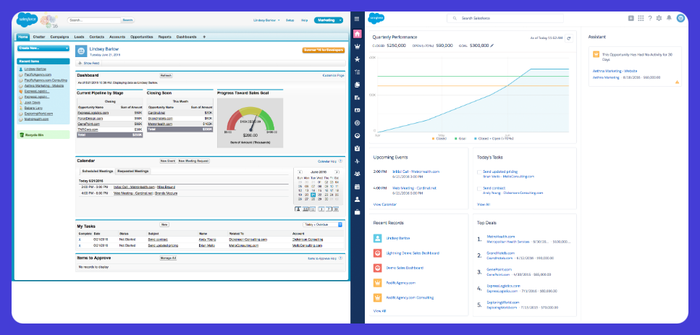
Why an alternative to Salesforce could be a good idea
Salesforce might look like the ultimate CRM, with its wide adoption across industries and business sizes. But for many teams, its challenges – like cost, complexity, and steep learning curves – can overshadow its benefits. Reviews speak for themselves:
- High management costs and additional purchases make Salesforce a tough choice for budget-conscious businesses. 'It costs too much to have to get it fixed all the time and have to always buy more products.' Capterra
- Some users find the interface less intuitive compared to newer CRMs. 'The UI is also quite outdated and not that user-friendly.' Capterra
- The platform’s complexity can overwhelm new users, slowing down implementation. 'It costs too much to have to get it fixed all the time and have to always buy more products.' Capterra
- Lengthy setup processes can delay productivity, especially for teams without expert help. 'It takes quite some time to get things set up.' Capterra
- Slow customer service responses can lead to frustrating delays. 'Salesforce support could be more responsive than current turnarounds.' Capterra
- The extensive features – while substantial – require significant training and adjustment. 'One challenge I’ve encountered is the steep learning curve.' Capterra
- The platform can struggle with specific business models or advanced needs. 'Salesforce doesn’t seem to work well for dual product verticals with shared customers.' Capterra
These concerns show why Salesforce isn’t always the answer. We’ve curated 7 alternatives that offer small businesses a smarter, more budget-friendly fit.
Top 7 Salesforce alternatives
#1 Capsule CRM
What if your CRM gave you everything you need – without the unnecessary complications? Built for small businesses and startups, Capsule focuses on the essentials: managing relationships, tracking leads, and growing your company.
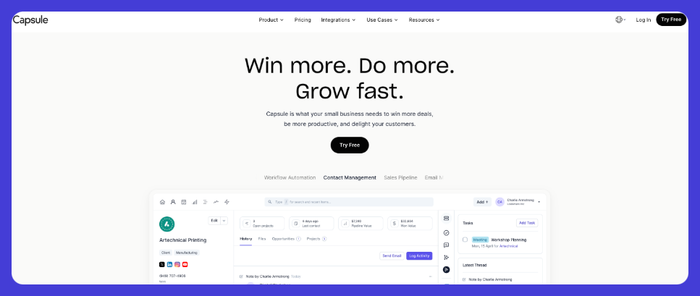
Capsule CRM keeps things simple, effective, and affordable for small businesses that want results without the headaches. It proves that sometimes, less truly is more – giving you powerful functionality, minus the frustration.
Capsule CRM features
- Deal and lead management: Keep track of every deal in progress with clear, easy-to-read sales pipelines.
- App integrations: Connect with G Suite, Mailchimp, QuickBooks, Xero, and more for seamless workflows.
- Task management: Assign and monitor tasks to keep your team aligned and productive.
- Email integration: Sync with Gmail and Transpond to centralize communications and keep everything in one place.
- Reporting and analytics: Generate detailed reports to understand your performance and make informed decisions.
- Project management: Use boards to track project progress and deliverables at a glance.
- AI-powered email assistant: Create tailored, professional emails quickly using AI-driven prompts.
- Workflow automation: Automate repetitive tasks and reduce time spent on routine duties.
- Integrations: Connect Capsule CRM with external tools to extend its capabilities.
Capsule CRM pricing
- Starter Plan ($18/user/month): Includes up to 30,000 contacts, email templates, a shared mailbox, premium integrations, and basic reporting.
- Growth Plan ($36/user/month): Expands to 60,000 contacts and adds workflow automation, advanced sales reporting, multiple pipelines, and project management tools.
- Advanced Plan ($54/user/month): Designed for growing teams with 120,000 contacts, multiple project boards, and enhanced customer profiles.
- Ultimate Plan ($72/user/month): Tailored for larger teams, with 240,000 contacts, priority support, a dedicated account manager, and custom training.
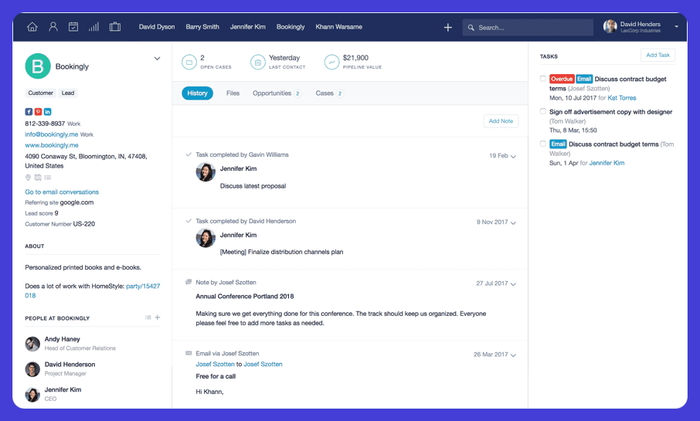
Why Capsule CRM is the perfect alternative to Salesforce
If Salesforce feels overwhelming – whether it’s the cost, complexity, or endless features you don’t use – Capsule CRM offers a refreshing change.
An easier start for small teams
Capsule is built for small businesses and startups, so it’s intuitive and easy to adopt without weeks of training. While Salesforce’s customization options can be powerful, they often come with a steep learning curve and added expenses. Capsule keeps it simple while still giving you the flexibility to tailor it to your needs.

'It's not only a CRM, it's a workhorse taking away so many day-to-day admin tasks through its integration with other software that we use.' G2
Effortless to use
Capsule CRM features an intuitive and clean interface, so anyone can start using it immediately. There’s no need for complex setups, expensive consultants, or endless CRM training sessions.
It connects with your existing tools - like Gmail, QuickBooks, and Xero - so you don't have to worry about additional integrations.

'After experimenting with several different trials of other CRMs, I find Capsule to have a great user interface and is easy to use.' G2
Less bloat
Unlike Salesforce, Capsule focuses on the tools that small businesses use daily. It’s easy to navigate and avoids the feature overload common in larger CRMs.

'The interface is intuitive, and it’s easy to access the information I need without being overwhelmed.' G2
If your priority is finding a CRM that works with you instead of adding extra layers of complexity, Capsule is a wise choice.
Ready to see Capsule CRM in action?
#2 Nimble CRM
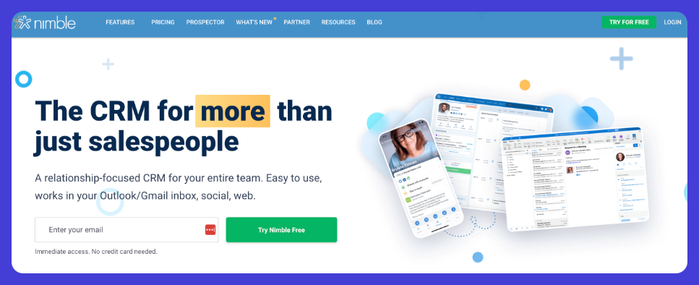
Nimble stands out as a CRM that combines social media insights and email integration to keep your customer relationships front and center.
Nimble CRM features
- Email and social media integration with Microsoft 365, Google Workspace, and major social platforms.
- Contact management for up to 25,000 contacts, with scalable limits for growing teams.
- Personalized bulk email campaigns with open and click tracking.
- Customer detail collection and updates through web forms and data enrichment tools.
Nimble CRM pricing
Nimble’s plan starts at $29.90 per user/month, billed monthly, and includes 25,000 contact management records, 2 GB of storage, and integration with Microsoft 365 and Google Workspace. Adding additional features, like expanded storage or contact limits, is possible for an extra cost.
Nimble CRM cons
- The limits on contacts and storage might not work for larger or fast-growing teams.
- Nimble lacks advanced reporting features that are available in other CRMs.
- Adding features like extra storage or more contacts can increase overall costs.
#3 Zoho CRM
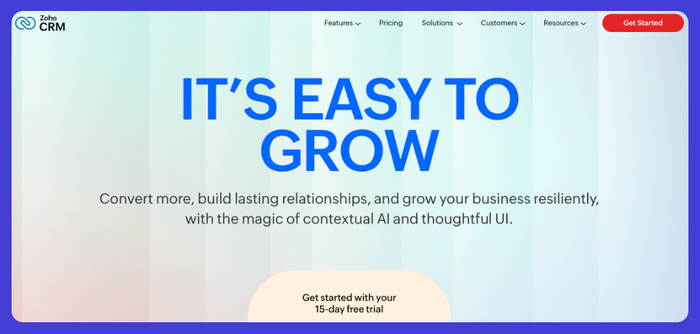
Zoho CRM brings a wide range of tools to the table, from lead management to workflow automation. Tightly integrated with Zoho’s ecosystem, it provides impressive depth, but that can come at a cost.
Zoho CRM features
- Automated workflows to manage repetitive tasks.
- Detailed sales forecasting and analytics to track performance.
- Advanced customization with features like custom fields and modules.
- Third-party apps’ integration – including Google Workspace and Office 365.
- AI-powered insights through its Zia assistant for smarter decision-making.
Zoho CRM pricing
- Zoho’s pricing starts with the Standard plan at €20/month per user, including mass emails, workflows, and reporting tools.
- The Professional plan (€35/month) adds inventory management and advanced sales features.
- The Enterprise plan (€50/month) includes AI, multi-user portals, and journey orchestration.
- Finally, the Ultimate plan (€65/month) unlocks extended AI capabilities and unified business analytics.
Zoho CRM cons
- Steeper learning curve due to its extensive features.
- Pricing can add up quickly with advanced plans.
- Basic support may feel insufficient for teams needing immediate help.
Zoho CRM offers plenty of functionality, but as you can see, it’s not without drawbacks.
#4 Copper CRM
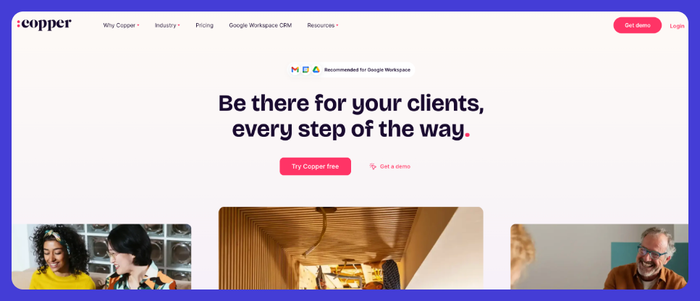
Built for teams relying on Google Workspace, Copper simplifies lead, task, and contact management.
Copper CRM features
- Integration with Google Workspace for synchronized communication.
- Lead and contact management through an intuitive system.
- Task automation for repetitive processes and improved efficiency.
- Collaboration tools for easier teamwork within the platform.
Copper CRM pricing
- The Starter plan is $12/month per user, perfect for small teams with up to 1,000 contacts and essential features like tasks and forms.
- The Basic plan, at $29/month per user, adds task automation and project management for up to 2,500 contacts.
- For larger needs, the Professional plan ($69/month per user) supports 15,000 contacts and bulk email capabilities.
- Lastly, the Business plan ($134/month per user) unlocks unlimited contacts and advanced analytics.
Copper CRM cons
- Limited integrations outside of Google Workspace may restrict non-Google users.
- Contact limits on lower plans may not suit fast-growing teams.
- Higher-tier plans can get pricey compared to other CRMs.
Copper CRM works well for businesses using Google Workspace – keeping workflows simple and integrations smooth. That said, its pared-down approach can feel limiting for teams looking for more advanced tools or customization.
#5 Insightly CRM
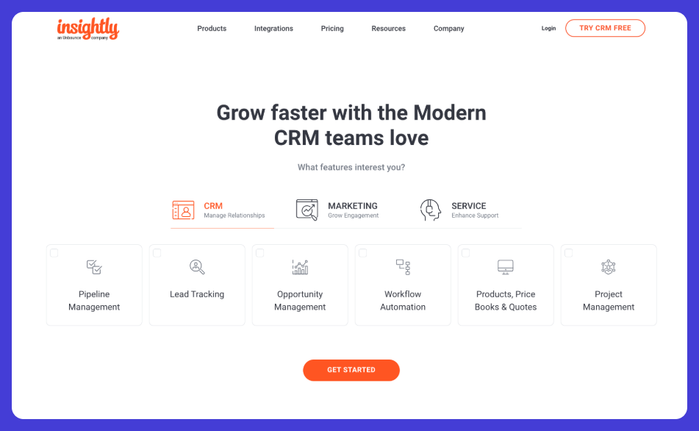
Need a CRM that does more than just manage contacts? Insightly combines customer relationship management with project tracking, giving businesses one platform to handle leads, automate tasks, and monitor projects.
Insightly CRM features
- Centralized customer interactions and data in an accessible, organized space.
- Project tracking alongside customer details for sales-to-delivery alignment.
- Task automation for time-saving and improved focus on strategic work.
- Customizable dashboards for quick insights into sales and project progress.
- Dozens of integrations via AppConnect.
Insightly CRM pricing
- The Plus plan starts at $29/month per user, covering lead and project tracking along with basic reports.
- The Professional plan costs $49/month and adds workflow automation and more customization.
- For larger teams, the Enterprise plan at $99/month includes advanced features like audit logging, price books, and expanded capabilities.
Insightly CRM cons
- Limited record storage on lower plans can be a bottleneck for growing teams.
- Advanced tools like sandboxing and audit logging are available only on the most expensive plan.
Insightly suits teams managing both customer relationships and projects, but its higher-tier pricing may feel out of reach for smaller businesses.
#6 HubSpot CRM
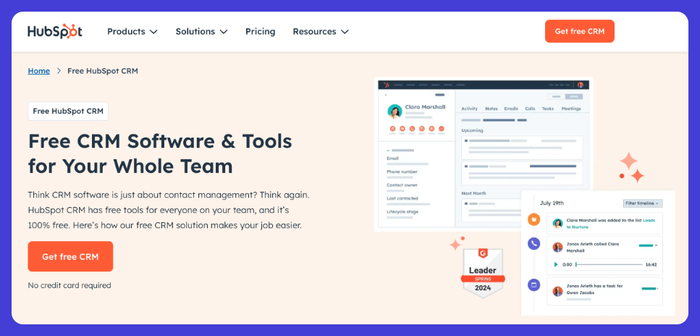
What if you didn’t have to choose between growth and simplicity? HubSpot CRM delivers tools for sales, marketing, and support in one place, allowing for easy scaling.
HubSpot CRM features
- Centralized system for tracking leads, deals, and customer interactions.
- Task automation for follow-ups and lead nurturing.
- Built-in content management system for blogs and websites.
- Detailed analytics and dashboards for monitoring sales and marketing performance.
HubSpot CRM pricing
- Free Plan is useful for startups – offering basic CRM tools for up to 2 users.
- Starter Plan starts at €15/month per user, adding features like email marketing and sales automation.
- Professional Plan (€1,143/month for 5 seats) includes advanced tools like workflows and reporting.
- Enterprise Plan (€4,200/month for 7 seats) is rather for large teams with extensive customization needs.
HubSpot CRM cons
- Pricing escalates quickly for higher-tier plans – a Starter Plan is affordable, but Professional or Enterprise plans are considerably more expensive.
- Some advanced features, like in-depth reporting, are locked behind expensive plans.
- The interface may feel outdated but also overwhelming.
HubSpot CRM offers powerful features for growing businesses, but its complexity and cost can be overwhelming for smaller teams. Capsule provides a simpler, more affordable alternative that keeps your workflow focused!
#7 Instantly CRM
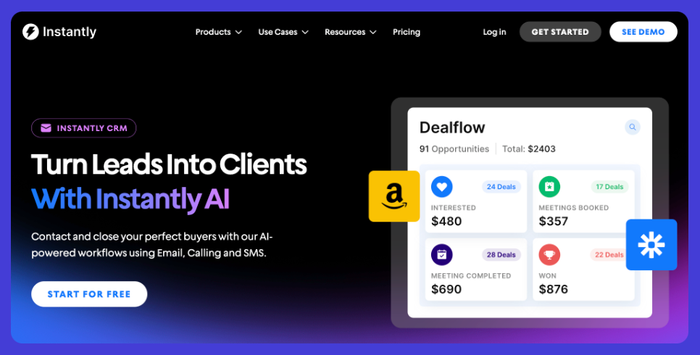
Instantly CRM is built for sales teams that live and breathe outreach. It organizes leads and tracks every opportunity. Designed to power cold email campaigns, it connects with automation and analytics tools helping sales teams reach the right people and close deals faster.
Instantly CRM features
- Lead tracking and management for improved organization.
- Marketing and sales process automation with customizable scenarios.
- Website visitor monitoring for lead identification.
- Centralized communications through a unified inbox for emails, calls, and SMS.
- AI-powered tools for personalized outreach.
Instantly CRM pricing
- The Growth plan starts at $37/month, including unlimited email accounts and warmups with 5,000 monthly emails.
- The Hypergrowth plan costs $97/month, increasing the email limit to 100,000 and adding premium support.
- The Light Speed plan, priced at $358/month, allows 500,000 emails and 100,000 uploaded contacts.
Instantly CRM cons
- Limited customization within the CRM itself.
- Paying separate fees for essential features like email verification and calls can complicate pricing.
- Analysis of campaigns is difficult due to a lack of depth in reporting tools.
While Instantly CRM is a solid add-on for Instantly users, its pricing model and simplicity might not appeal to those seeking a standalone, flexible CRM.
Find the right CRM for your business
Not every business needs a platform as heavy as Salesforce. For some teams, it creates more headaches than progress. The right CRM matches your needs – whether it’s affordability, simplicity, or tools that tackle real challenges. Capsule delivers flexibility without the clutter, while platforms like Instantly offer AI-driven workflows to power outreach.
So, are you ready for something better? Try Capsule CRM for free and see how smooth and effective CRM can be.

